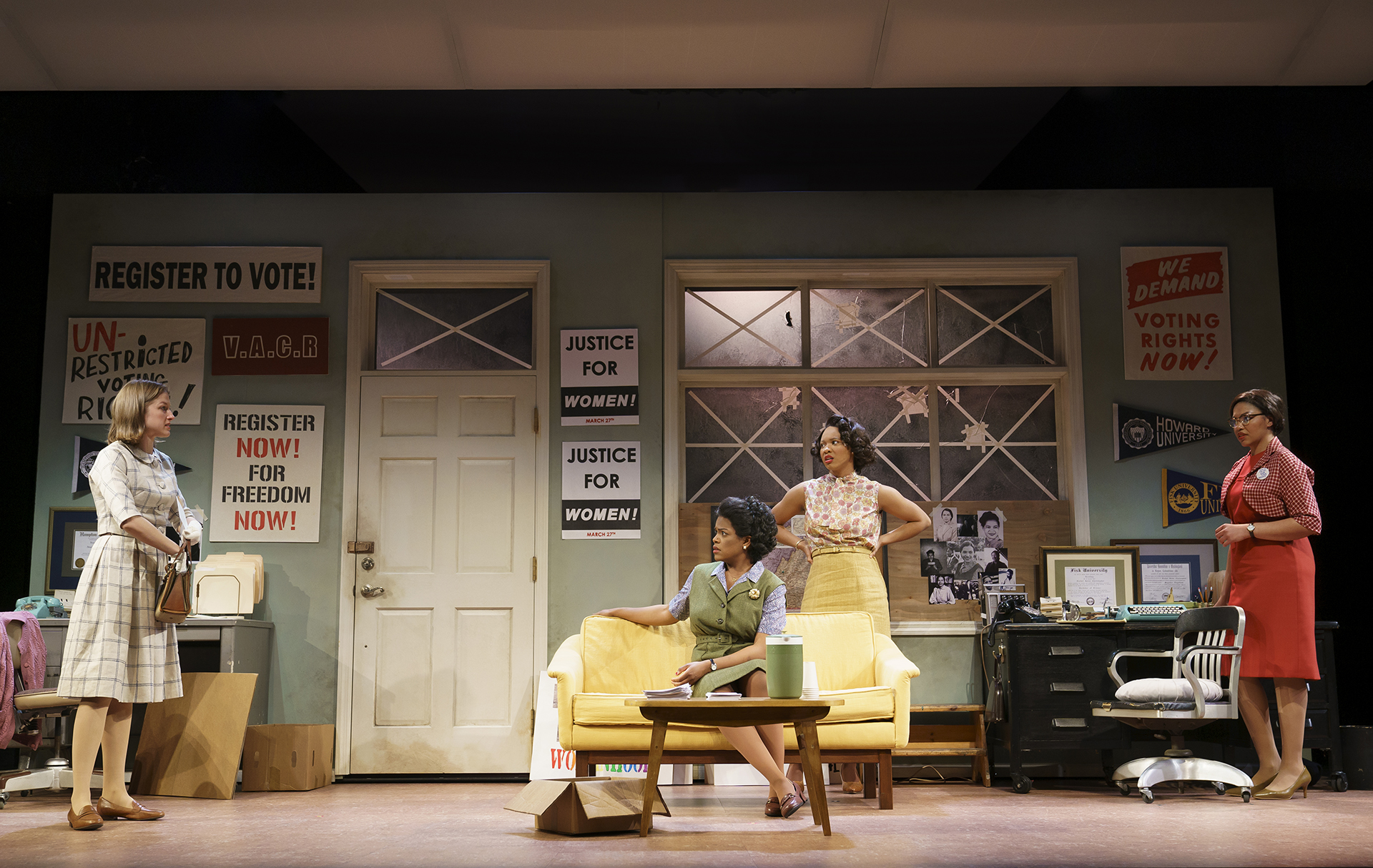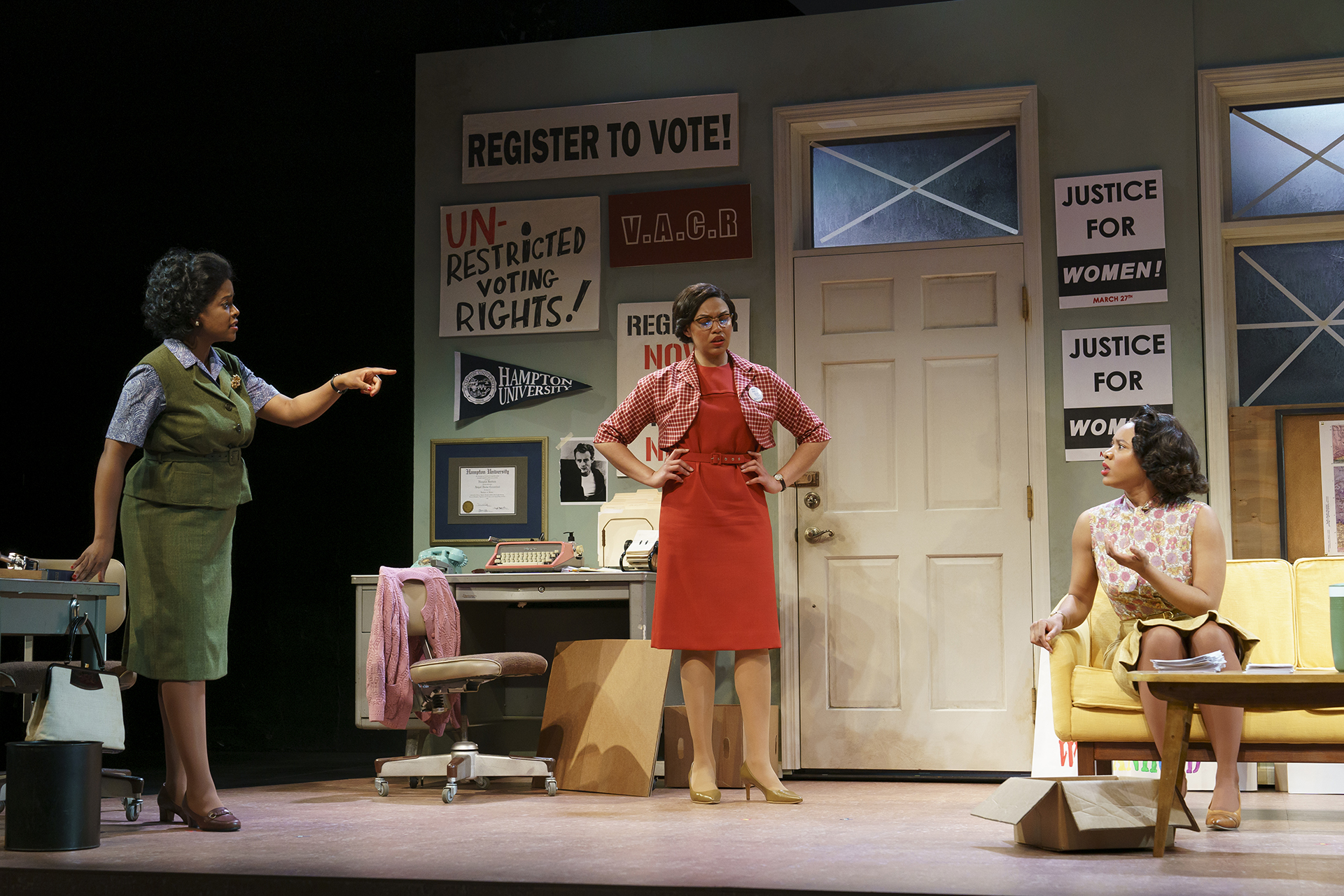Review of Cadillac Crew, Yale Repertory Theatre
The links between the civil rights movement of the 1960s and the Black Lives Matter movement begun in the 2010s are dramatized in Toni Sampson’s intensely questioning play, Cadillac Crew, now in its world premiere at Yale Repertory Theatre, directed by Sampson and Jesse Rasmussen. An early staged reading of the play, directed by Rasmussen, took place at the Yale Summer Cabaret when Sampson and Rasmussen were rising third-years at the Yale School of Drama in 2016.
In the play’s first part, four women tease and taunt each other while working together in a civil rights office in Virginia in the early 1960s. Rachel (Chalia La Tour) is the dedicated leader, bossy, prim, always with her eye on the prize; Dee (Ashley Bryant) is the eldest, a mother and a wife, and more phlegmatic than the rest; Sarah (Brontë England-Nelson) is the white girl, descendant of a suffragette, but with a backstory only Rachel knows; and Abby (Dria Brown) is the youngest, her sensibility closer to our times than the times she’s living in. Which means she has most of the funny lines.
Sarah (Brontë England-Nelson), Dee (Ashley Bryant), Abby (Dria Brown), Rachel (Chalia La Tour) in the Yale Repertory Theatre production of Cadillac Crew, directed by Jesse Rasmussen and Tori Sampson (photo by Joan Marcus)
While establishing the where, when, and what of these women’s lives, Sampson engages with issues and draws out character. Asides, such as the fact that Rosa Parks became a figurehead for the civil rights movement because of her looks and because an earlier activist who made the same protest was unmarried and pregnant, rub against bits of personality, such as Rachel’s efforts to write speeches; Abby’s crush on James Dean and her assumption that Rachel is a lesbian; Dee’s decision to give her twelve-year-old daughter a penknife when the girl has to attend a mostly white school (as a weak local effort to comply with desegregation); and Sarah’s way of worming the truth out of Abby while hinting at a truth of her own.
Throughout the play, La Tour’s Rachel provides important moments of emotional focus with impressive presence, while Brown’s Abby keeps up a welcome buoyancy, as when she steps up to mimic a lead singer, telling Dee she’s too old and Sarah she’s too white to sing lead. As Act 1 closes, a shocking atrocity against a “Cadillac crew” (a desegregated carload of women on the road to register voters) galvanizes the women as Rachel, with keen defiance, resolves to form another crew and take to the road.
Dee (Ashley Bryant), Abby (Dria Brown), Sarah (Brontë England-Nelson) (photo by Joan Marcus)
After intermission, Jessie Chen’s realistic office set becomes a more schematic space representing a road and the front end of a car, framed by areas for Rasean Davonte Johnson’s gloomy projections of roads, woods, and weeds illuminated by car lights. Dialogue comes to a standstill as the women offer pages from their journals, then, under the threat of prowling white men, the crew gets stuck when the car breaks down. Some new elements come to light but a significant testing of the women’s resolutions and solidarity (that seemed likely at the end of Act 1, arguably) never materializes.
After a projection-collage of timely items, we find ourselves in the era in which Sampson wrote the play, in response to events that gave rise to Black Lives Matter in 2013, with the acquittal of George Zimmerman in the killing of Trayvon Martin, and the 2014 protests in Ferguson, MO after the death of Michael Brown at the hands of a police officer. We watch a broadcast where three women who are major figures in Black Lives Matter—Opal Tometi (Brown), Patrisse Cullors (Bryant), and Alicia Garza (La Tour)—speak out to a journalist (England-Nelson). Accompanied by a pyrotechnic display of thunder and lighting, the three guests read a utopian text that makes a request to dream a sacred America, “an America where you are not better than but equal to”—words penned by Rachel in 1974, now held up as inspiration going into election 2016. And, by extension, the next one.
Dee (Ashley Bryant), Rachel (Chalia La Tour), Abby (Dria Brown) (photo by Joan Marcus)
The challenge of societal injustice confronts all the characters in Cadillac Crew at every turn, even as they all work to offset its worse effects, work the play joins as though an exemplary fulfillment of Rachel’s hopes. One of Sampson’s key points is that women like those we meet in Act 1 have been erased from history, but the play erases these women in turn, as the effort to delineate personal histories, as in the play’s plot-heavy 1960s, is jettisoned for the public voices and hashtag slogans of the current friending and sharing climate. In its conclusion, the play offers theater that, like Karen Hartman’s Good Faith staged at Yale Rep earlier this year, takes on our times with as little filter as possible. The effect is a bit like being accosted to sign a petition or make a donation, or, indeed, to vote—or take to the streets.
As Rachel says early on, criticizing high-minded rhetoric that lacks practical application: “Without demands or a plan to infiltrate, it’s merely a performance. I can go to the theater for all that.” It’s at least an irony—whether deliberate or not—that Rachel’s own words, late in the play, become the basis for just such a theatrical performance by rights activists. When demands occur within theater, it is up to the individual viewer to determine the force of the interpellation, and how effective a performance is as a means to command change.
With its unflinching effort to incorporate the long history of racial injustice since its alleged end with the phasing out of Jim Crow laws, Cadillac Crew aims to be a telling provocation, but its discursive quality makes for a labored transition from page to stage.
Cadillac Crew
By Tori Sampson
Directed by Jesse Rasmussen and Tori Sampson
Scenic Designer: Jessie Chen; Costume Designer: Matthew R. Malone; Lighting Designer: Kathy A. Perkins; Sound Designer: Andrew Rovner; Projection Designer: Rasean Davonte Johnson; Production Dramaturgs: Amy Boratko, Sophie Siegel-Warren; Technical Director: Alexandra McNamara; Vocal and Dialect Coach: Ron Carlos; Stage Manager: Olivia Louise Tree Plath
Cast: Dria Brown, Ashley Bryant, Bronté England-Nelson, Chalia La Tour
Yale Repertory Theatre
April 26-May 18, 2019


